- Home
- Captain W E Johns
50 Biggles and the Pirate Treasure
50 Biggles and the Pirate Treasure Read online
BIGGLES AND THE PIRATE TREASURE
Air Detective-Inspector Bigglesworth and his staff at Special Air Section Operational headquarters were just going out to lunch when a dark, alert, dapper face appeared in the open doorway.
'Well, well. Look what the slipstream's blown in,' said Ginger Hebblethwaite cheerfully.
'Hello, Marcel. What brings you here ? ' greeted Biggles.
Marcel Brissac, Biggles's opposite number in France, came into the room.
'Bonjour.
Bonjour mes amis,' he cried. 'How go you?'
'Oh, struggling along,' answered Biggles. 'We were just going out to tear a steak.'
'You know a good place to eat?'
'We do.'
'Bon. I come with you.'
'That's fine. But tell me. Are you here on pleasure or business? '
'On pleasure to see you before I go to business. Perhaps this time business will be a pleasure also. That is why I come to see you. Always I think of my friends. Alors! We have the pique-nique.'
'Where ? '
'In Madagascar.'
'That's a long way to go for a picnic. What's wrong with Richmond Park?'
Àh ! But there we do not find the box of gold.'
'What box of gold? I've heard of these boxes of gold before,' said Biggles sceptically.
'Certainly the gold is there. All we have to do is dig it up. You come with me. We make it a holiday. Everything is-what you say-laid on.'
'Before I make any rash promises I'd like to know a little more about this alleged parcel of bullion. You can tell us about it over lunch. Come on.'
At a quiet corner table in the restaurant where the Air Police usually had lunch Marcel told his story. Biggles listened with amusement; the others with delight, particularly as the first part was factual in substance, although, as Marcel himself admitted, the accounts of contemporary writers varied considerably in detail. He had studied them all, but relied chiefly on the narrative of Captain Charles Johnson, set down in his General History of the Robberies and Murders of the Most Notorious Pirates, a small volume first published in 1724.
The gist of the story may be followed more easily in plain English than in the voluble mixture of French and English employed by Marcel when he got excited. As he approached the climax he fell more and more into his mother tongue, as was natural.
About two hundred and fifty years ago there lived one of the most unorthodox pirates of all time. A mild, good-natured man who disliked bloodshed, his name was Misson. Son of an old French family, he was given a good education, went to a military academy and was to have become a soldier.
But (like many boys before and since) he wanted to see the world, and at last prevailed upon his father to allow him to become a sailor. The ship he joined was a French man-o'-
war named Victoire.
On board, unfortunately for him, he came under the influence of a renegade priest named Caroccioli, who had ambitious ideas for becoming rich quickly. To make a long story short Misson was persuaded by him to go on the 'grand account,' as piracy was called by those who practised it. The opportunity came when the captain of the Victoire was killed in an engagement with an English ship. Caroccioli made a speech to the crew as a result of which Misson took command, and hoisting the Jolly Roger sailed off to make his fortune.
For a time all went well. One of his first prizes was an English ship that yielded £70,000
in minted gold apart from other booty. From another ship he took
£200,000, and from a Portuguese vessel more than half a million. All this was in the Indian Ocean.
With his holds bulging with loot Misson followed the usual pirate practice of looking for a place ashore where the treasure could be hidden while he went out for more. The place chosen was a little bay at the northern tip of Madagascar, an island about which at that time little was known except that it was inhabited by savages. Here Misson spent three months, burying the treasure, careening his ship and building forts for the defence of the place should they be attacked by the savages. He called the place Libertia, or Libertata.
Putting to sea again who should he encounter but the notorious pirate, Captain Thomas Tew. Tew hailed from New York, then a British colony. As an honest sailor he had been commissioned by the Governor of Bermuda to attack a French fort on the coast of West Africa. Instead, he went
'on the account.' Learning of this King William III ordered one of his ships, the Adventure, under the command of 'our trusty and well-beloved Captain William Kidd' to hunt down Tew and destroy him. All the world knows how Kidd himself turned pirate and was subsequently hanged at Execution Dock. But Kidd has nothing to do with our tale.
Misson met Tew. They joined forces, and together took many valuable prizes, afterwards returning with their loot to Libertia. Now Tew had always been against Misson's habit of allowing prisoners to go free. He believed in the old pirate motto 'dead men tell no tales.'
And, since we must stick to the truth, he was right. Two men whom Misson released (on a promise not to betray his hiding place on Madagascar) went straight to the Portuguese authorities, with the result that five men-o'-
war were soon on their way to Libertia.
Misson, Tew and Caroccioli, held them off for a time. But they realized that Libertia as a hiding place was finished, so leaving Caroccioli in charge they went off down the coast to look for a more secure retreat.
While they were away a cyclone struck Libertia and the place, as well as the ships (except two small galleys) was wrecked. To complete the ruin the camp was attacked by a horde of savages from the interior. Caroccioli was speared to death. Misson and Tew, abandoning a treasure estimated at not less than five million pounds, fought their way to the beach and escaped in the two galleys.
But their troubles were not over. Sailing in consort they were overtaken by another storm. Misson's ship went down with all hands. Tew carried on, took a few prizes, and then returned to his home in America where he settled down to a comfortable old age.
One account says he died there. But Captain Johnson, the contemporary writer, says no.
He states that some of Tew's old crew, having squandered their money, found him, and persuaded him to make one more trip. Or, what is more likely, suggested that they went to Madagascar to recover the treasure left there.
Be that as it may (for it doesn't affect our story) off the African coast they ran foul of a big ship belonging to the Great Mogul, and in the action that followed Tew was killed, being struck in the stomach by a cannon ball. The fact that such details are known supports Captain Johnson's declaration that Tew was killed at sea. It should be noted that Tew's earlier adventures on Madagascar are known because he kept a record in his log-book, which was found after his death.
So much for the historical aspect of Marcel's story. That a vast treasure was buried in a cove at the northern end of Madagascar is certain. There is no record that it was ever recovered. We may also be sure that within a very short time the fast-growing tropical jungle would soon obliterate all signs of Libertia. At all events, the site has never been located.
Many years were to pass before the savages were subdued. Had they found the treasure, coins or valuable objects would almost certainly have been found in their possession by the French colonists who came later.
From nautical history Marcel jumped to modern events. Madagascar was, as he pointed out, a French colony, and any treasure found there (particularly as it was stolen gold) would automatically become the property of the French Government. In any case, Misson was a French citizen, even
if he was a pirate. There was now reason to suppose that someone, who also knew about the treasure, was well a
ware of this, and was trying to recover the gold by underhand methods.
Native rumours had reached the administrators in Tananarive, the capital, of a party of white men seen digging near the coast on the northern tip of the island. As there was no record of anyone having received official permission to do this - or, indeed, of anyone having applied for permission-the matter was investigated. This was not easy, for the island, the third largest in the world, lying two hundred and fifty miles from the African mainland, is nearly a thousand miles long and three hundred and sixty miles across at its widest part.
Nevertheless, the rumours were substantiated. The white men were found.
Surprised, they fled into the jungle - proof that they were doing wrong, and were aware of it. The French government, said Marcel, had no doubt whatever concerning the purpose of this party. They suspected that they had a private yacht, or a vessel of some sort, handy, for they had not passed through the usual landing formalities. His government, went on Marcel, would not have taken a serious view of this unlawful behaviour -
feeling sure that the quest would end in failure - had it not been for one thing. A very remarkable thing, asserted Marcel, mysteriously, evidently determined to make the most of a dramatic climax. When the white men had bolted one of them had dropped a notebook.
An ordinary cheap little book. On the fly-leaf he had written his name.
So the name of at least one of these white men was known. There was good reason to suppose he was the leader.
Marcel looked from one to the other. 'Can you imagine what that name would be ? ' he whispered.
'I haven't a clue,' murmured Biggles.
'few!' cried Marcel. 'Thomas Tew ! '
There was a silence that lasted for half a minute. Then Biggles said:
'What a remarkable thing.'
Marcel, his face alive, turned on him. 'Remarkable! You ask me to think this is — what you say — coincidence ? '
'I didn't say that,' protested Biggles.
'Then why do you say remarkable? Is it not a most natural thing ? '
'You believe this man to be a descendant of the original Thomas Tew ? '
Marcel flung up his arms. 'But of course! What else? Ecoutez. Tew, this one who was a pirate, knows where his gold is hid. Perhaps he will forget. So he writes the place in a book; or perhaps on a piece of paper.
Perhaps he makes a map. These things they pass from father to son for many years. Now here is one who looks carefully through all the old things. Perhaps he does not think of treasure, but it is droll to read through old papers. Then he finds the map. The word Libertia! He strikes his hand to his head. "
Voila!" he shouts. "The treasure of my great-great-grandfather. I am millionaire! I am Monte Cristo! But this Madagascar? She is big. She is far away. I have no money for a ship. If I go the French say what you do here, hein? They take my map, my papers. This will not do. I will find a man with a ship. I will show him my paper, and he will say bon, let us go and make ourselves rich men." Now these men are in Madagascar.'
There was another short silence. Biggles was smiling at Marcel's fervour.
'And what are you, personally, going to do about it ? ' he asked.
'I go to Madagascar,' declared Marcel. 'The government tell me, take an aeroplane and find these men. If you cannot find the men, find the ship.
Then we will seize it. So I get ready to go. Then I think hunting alone is not good. I will invite that old dog Beegles and will make a grand pique-nique
'That was a very nice thought,' agreed Biggles.
'You come?'
'If the Air-Commodore will give us time off.' Wagnifique. Ask him quickly. I am mad to find this gold.'
'But I thought your job was to find the men ? '
Marcel shrugged. 'What are men? We can find men any day. But gold - no.
We find the gold. Perhaps we find the men as well. Then we have everything.'
Biggles got up. 'Just a minute. I'll see how the Air-Commodore feels about this.'
'If you come we fly down British Africa with no troubles,' explained Marcel.
Biggles looked at him reproachfully. 'I should have known there was a trick in it,' he said sadly. 'By the way, what's the idea of using an aircraft for this job? I mean, what about the ground forces? Couldn't they handle it ? '
'When you see Madagascar, my friend, you will understand. To walk about is not easy.
Also, it is slow, this jungle walking. You say go by a ship along the shore? That is no good either, because people hiding in the bushes see the ship before the people on the ship sees them. The aeroplane she is quick, and comes upon people suddenly. Looking down like a bird we see everything.'
Biggles smiled. 'I get it,' he said. 'I'll have a word with the Chief.'
A fortnight later, shortly after dawn, a French police six-seater helicopter buzzed its way slowly along the northern tip of the great African island. From it five pairs of eyes searched the beaches, the green jungle belt that fringed the foreshore, and the rugged massif behind it that rose to nearly five thousand feet. Far away to the south could just be seen the ten thousand foot peak of Tsaratanana.
To Ginger the scene was beginning to lose something of its novelty, for this procedure had been followed for three days, from dawn to dusk, without result. More than once he had recalled Marcel's remark :Wait till you see Madagascar.' Well, now they had seen it, and if it had convinced him of anything it was that they were wasting their time. He could well
understand why the pirates had chosen the place for a hide-out. It was apparent that an army, provided it did not light fires to make smoke, could conceal itself on this wild coast without much fear of detection.
And they were looking for a small party of men - half a dozen at most! He was not surprised that they had not found them.
Still, it was quite pleasant, this cruising along a tropic shore with the picturesque jungle on the one hand and a blue, island-studded ocean on the other.
Marcel had been right, too, in this respect. Surface vehicles would be useless for the work, for the simple reason there were no roads. Well, there was one, a comparatively short one, that French engineers had cut through virgin forest and frowning hills from Diego-Suarez, their base, to Ambilobe, where, confronted by a chaos of unsurveyed mountains, they had given up the battle with nature. Yet, curiously enough, there were several landing grounds for aircraft, mostly near the coast. They had chosen Diego-Suarez because the bay which it overlooked was believed to be the one often used by the pirates. Their fortified camp of Libertia could not therefore be far away, and it was reasonable to suppose that the treasure would be in the region.
The journey out had been uneventful. They had followed the main air route to Tanganyika and then flown across the Mozambique Channel, notorious for its dangerous seas, to their proposed base, passing on the way the delightful islands of the Comores Archipelago. Tananarive, the capital of the colony, they did not see, for it lay inland, far to the south.
After a day's rest they had begun their task, although this, so far, had turned out to be no more than a routine patrol. There was no further news of the alleged treasure-seekers.
Ginger realized that they, too, were faced with a difficult task. Even though they had a map, or directions for finding the hoard, they must have been appalled when they saw the country. Other treasure hunters have had this setback, for which reason, perhaps, few treasures-even the well-authenticated ones - have been recovered.
The weather, so far, had been fair; dry with cloudless skies, although they were approaching the season of the tremendous thunder storms which do so much damage to life and property on the island. It was, no doubt, one of these storms that had brought ruin to the pirate colony of Libertia and so resulted in the treasure being lost.
Rounding Cap d'Ambre, the extreme northern tip of the island, Marcel, who was at the controls, turned south, still following the coast, and so brought a new panorama into view. To Ginger, if not the others, the alluring bays
and beaches had a certain romantic glamour from the fact that some of the most celebrated pirates of all time must have known them intimately. It was also a fascinating thought that somewhere down there, under the sand or perhaps a spreading forest tree, there was a chest, possibly several chests, of gold coins of a dozen reigns.
Such a day as the one they now enjoyed, however, would not have suited the old-fashioned sailing ships, for not a breath of wind was stirring to ruffle a palm frond or the surface of the sea, which lay as fiat as the proverbial mill pond. Even the early morning mist still clung to the lower ground waiting for a breeze to disperse it. There was not a vessel of any sort in sight; not even a native canoe. But this, they had found, was usually the case. Only once had they seen a ship, a rusty tramp, ploughing a lonely furrow in a lonely ocean. The traffic lay nearer the African coast, two hundred miles or more to the west.
Marcel had said that only by air reconnaissance could the treasure-seekers be found; and that, the others had to agree, might be true; but an aircraft had its disadvantages. Chief of these was the noise it made, and this could not be prevented. By announcing its approach it would sound a warning to anyone below who did not wish to be seen; and there was no dearth of places for them to hide. They had merely to step into the deep jungle.

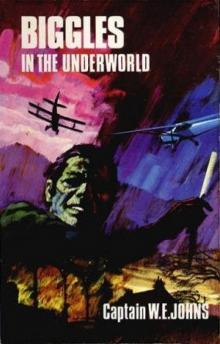 Biggles in the Underworld
Biggles in the Underworld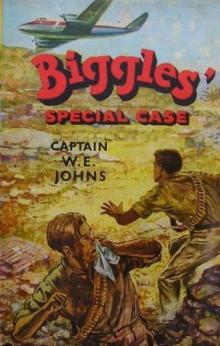 Biggles' Special Case
Biggles' Special Case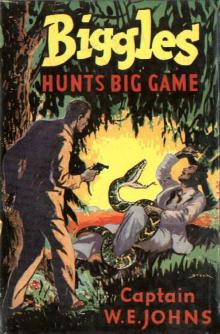 34 Biggles Hunts Big Game
34 Biggles Hunts Big Game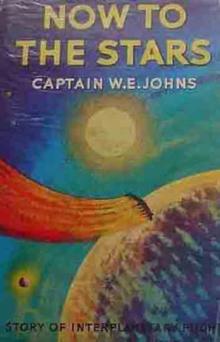 03 Now To The Stars
03 Now To The Stars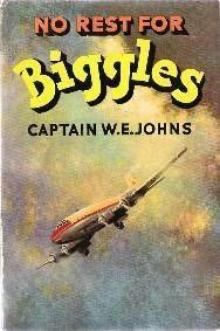 55 No Rest For Biggles
55 No Rest For Biggles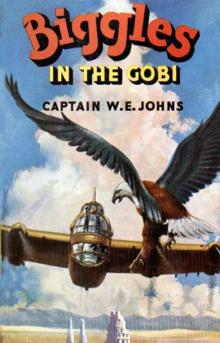 46 Biggles in the Gobi
46 Biggles in the Gobi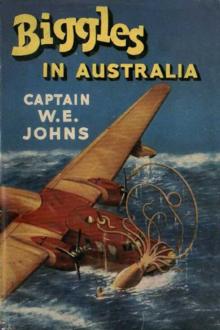 52 Biggles In Australia
52 Biggles In Australia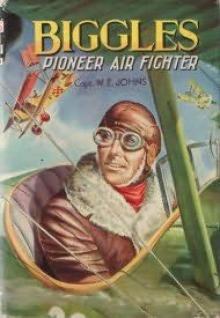 51 Biggles Pioneer Air Fighter
51 Biggles Pioneer Air Fighter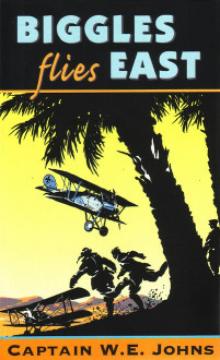 05 Biggles Flies East
05 Biggles Flies East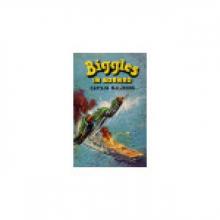 28 Biggles In Borneo
28 Biggles In Borneo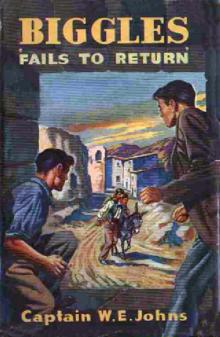 29 Biggles Fails to Return
29 Biggles Fails to Return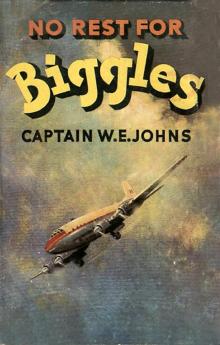 55 No Rest For Biggles (v2)
55 No Rest For Biggles (v2)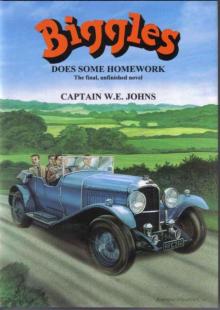 Biggles Does Some Homework
Biggles Does Some Homework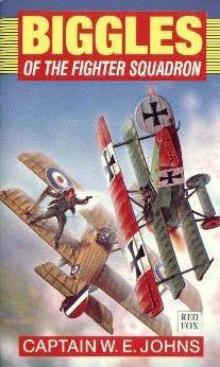 Biggles of the Camel Squadron
Biggles of the Camel Squadron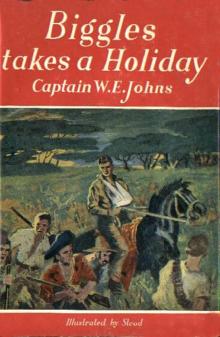 35 Biggles Takes A Holiday
35 Biggles Takes A Holiday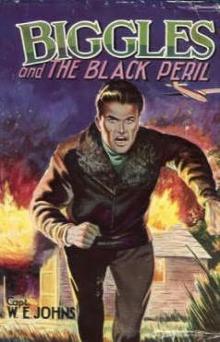 Biggles And The Black Peril (06)
Biggles And The Black Peril (06)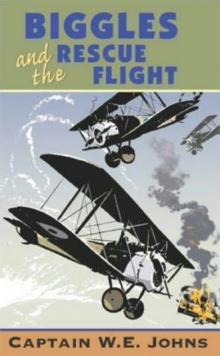 17 Biggles And The Rescue Flight
17 Biggles And The Rescue Flight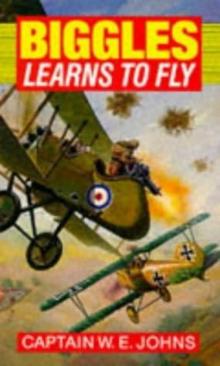 Biggles Learns To Fly
Biggles Learns To Fly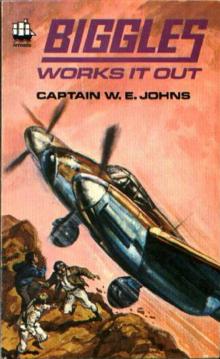 40 Biggles Works It Out
40 Biggles Works It Out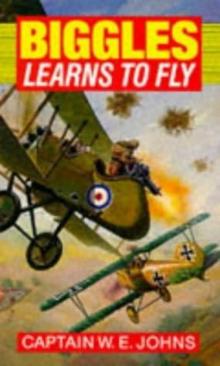 05 Biggles Learns To Fly
05 Biggles Learns To Fly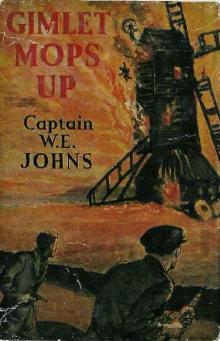 04 Gimlet Mops Up
04 Gimlet Mops Up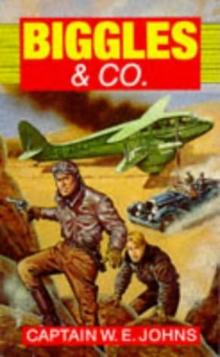 10 Biggles and Co
10 Biggles and Co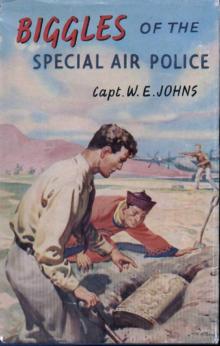 47 Biggles Of The Special Air Police
47 Biggles Of The Special Air Police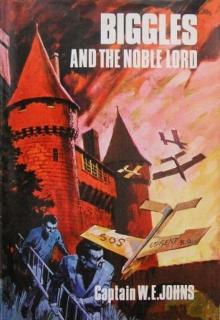 Biggles and the Noble Lord
Biggles and the Noble Lord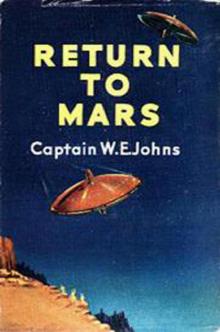 T2 Return To Mars
T2 Return To Mars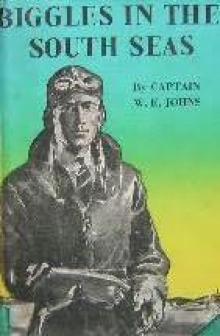 21 Biggles In the South Seas
21 Biggles In the South Seas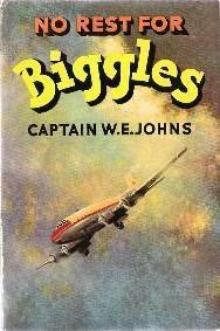 No Rest For Biggles
No Rest For Biggles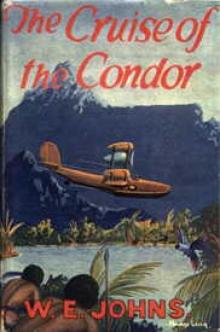 Biggles In The Cruise Of The Condor (02)
Biggles In The Cruise Of The Condor (02)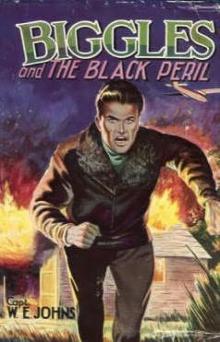 06 Biggles And The Black Peril
06 Biggles And The Black Peril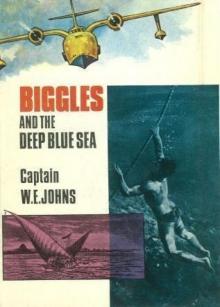 Biggles and the Deep Blue Sea
Biggles and the Deep Blue Sea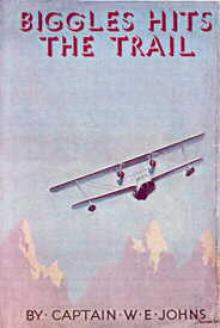 06 Biggles Hits The Trail
06 Biggles Hits The Trail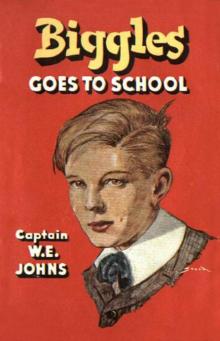 39 Biggles Goes To School
39 Biggles Goes To School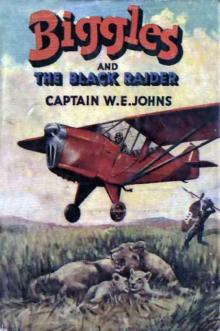 44 Biggles and the Black Raider
44 Biggles and the Black Raider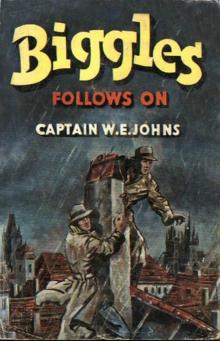 42 Biggles Follows On
42 Biggles Follows On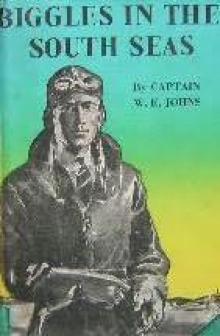 Biggles In the South Seas
Biggles In the South Seas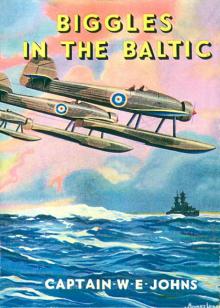 21 Biggles In The Baltic v3
21 Biggles In The Baltic v3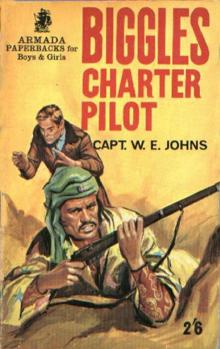 27 Biggles - Charter Pilot
27 Biggles - Charter Pilot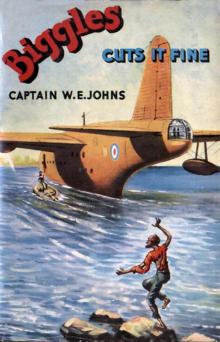 49 Biggles Cuts It Fine
49 Biggles Cuts It Fine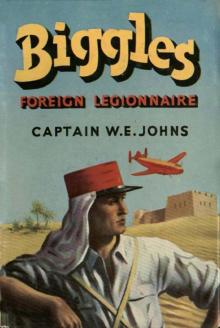 51 Biggles Foreign Legionaire
51 Biggles Foreign Legionaire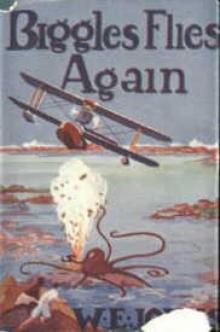 04 Biggles Flies Again
04 Biggles Flies Again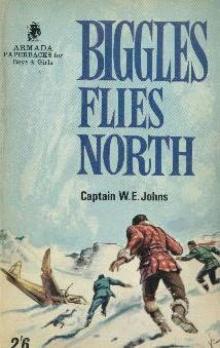 16 Biggles Flies North
16 Biggles Flies North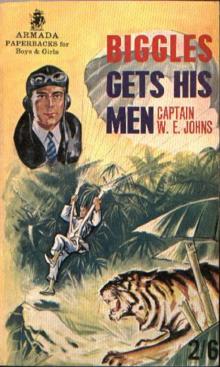 37 Biggles Gets His Men
37 Biggles Gets His Men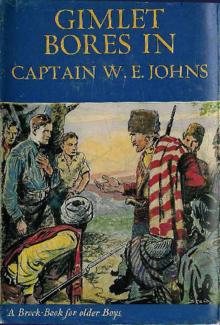 07 Gimlet Bores In
07 Gimlet Bores In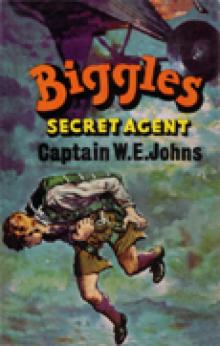 19 Biggles Secret Agent
19 Biggles Secret Agent 32 Biggles In The Orient
32 Biggles In The Orient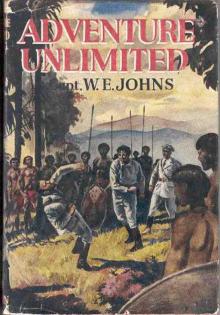 Adventure Unlimited
Adventure Unlimited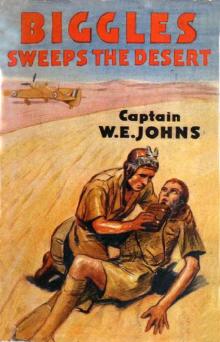 26 Biggles Sweeps The Desert
26 Biggles Sweeps The Desert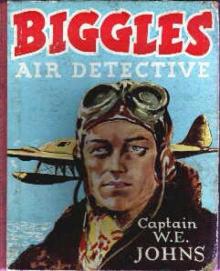 Biggles Air Detective (43)
Biggles Air Detective (43) 36 Biggles Breaks The Silence
36 Biggles Breaks The Silence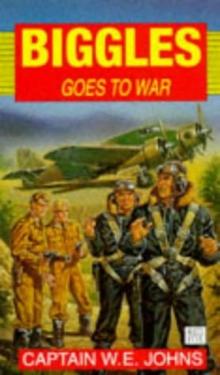 14 Biggles Goes To War
14 Biggles Goes To War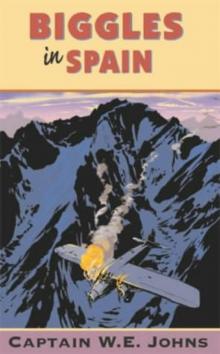 18 Biggles In Spain
18 Biggles In Spain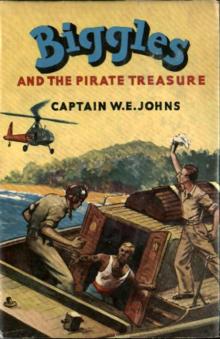 50 Biggles and the Pirate Treasure
50 Biggles and the Pirate Treasure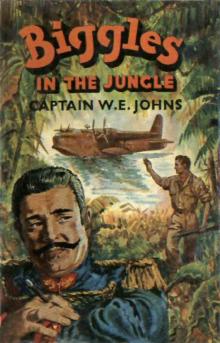 25 Biggles In The Jungle
25 Biggles In The Jungle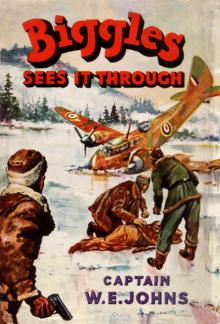 23 Biggles Sees It Through
23 Biggles Sees It Through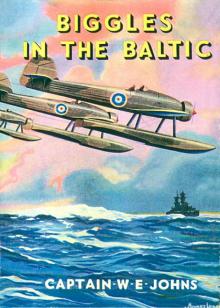 21 Biggles In The Baltic
21 Biggles In The Baltic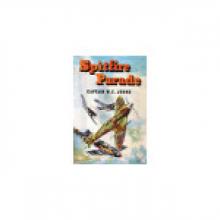 24 Spitfire Parade
24 Spitfire Parade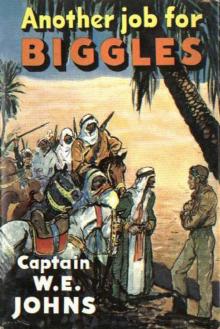 38 Another Job For Biggles
38 Another Job For Biggles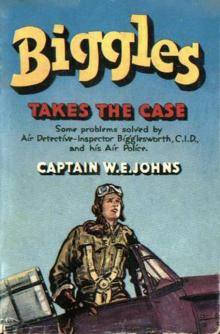 41 Biggles Takes The Case
41 Biggles Takes The Case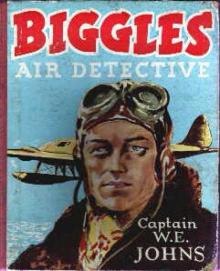 43 Biggles Air Detective
43 Biggles Air Detective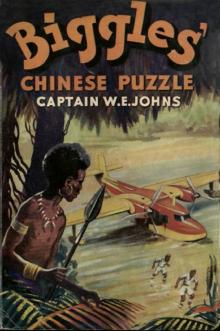 53 Biggles Chinese Puzzle
53 Biggles Chinese Puzzle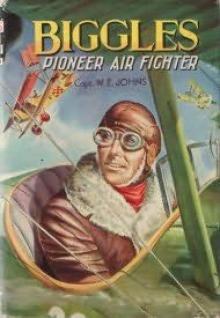 Biggles Pioneer Air Fighter (51)
Biggles Pioneer Air Fighter (51)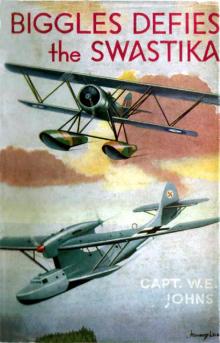 22 Biggles Defies The Swastika
22 Biggles Defies The Swastika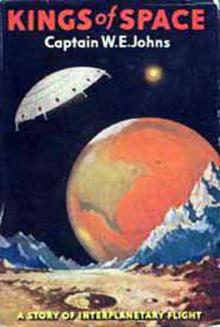 01 Kings Of Space
01 Kings Of Space